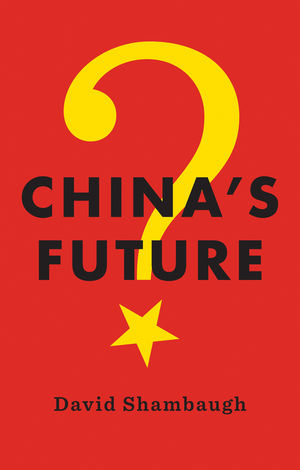Reading Recommendation: 'China’s Future?'

In a new periodic feature, Global Policy’s Board Members recommend books that have caught their attention.
China’s Future? by David Shambaugh, Cambridge: Polity, 2016. 224 pp, £50 hardcover 978-1-5095-0713-9, £14.99 paperback 987-1-5095-0714-6, £10.99 e-book 978-1-5095-0717-7 In 2015, the Wall Street Journal published an essay by David Shambaugh, professor of international affairs at George Washington University and a leading expert on Chinese politics, which caused an angry reaction in Beijing’s foreign policy circles. In ‘The Coming Chinese Crackup’, Shambaugh highlighted the threat that Xi Jinping’s shift towards ‘hard authoritarianism’ poses to the long-term viability of the country’s political stability. Some readers mistook the essay for a prediction of the imminent collapse of Communist rule. In his new book China’s Future?, published in 2016 by Polity, Shambaugh sets the record straight. In fact, Shambaugh believes that the country, or more accurately the Communist leadership, faces a fundamental choice between four possible pathways: neo-totalitarianism, hard authoritarianism, soft authoritarianism, and semi-democracy. It can stay on its current path of hard authoritarianism, with greater reliance on political repression and ever expanding constraints on civil society: but this would end up blocking much-needed reforms and accelerating the slowdown in the Chinese economy. Shambaugh believes this is the more likely outcome, due to a combination of path dependence and a ‘highly insecure regime that lacks intrinsic confidence’. Hard authoritarianism would protect the Communist Party’s dominant position in the short run, but would lock the regime into a lengthy and protracted process of decline, which may take years or even decades. It is in this sense that ‘the endgame has begun’, as Shambaugh had argued last year. Unless, of course, the leadership choses an alternative path, either a softer version of authoritarianism (with moderate reforms) or Singapore-style semi-democracy with fuller political and economic liberalisation. Shambaugh’s short book provides an excellent guide to the options that the Chinese leadership faces, even if the current drift into deeper authoritarianism seems unavoidable.
In 2015, the Wall Street Journal published an essay by David Shambaugh, professor of international affairs at George Washington University and a leading expert on Chinese politics, which caused an angry reaction in Beijing’s foreign policy circles. In ‘The Coming Chinese Crackup’, Shambaugh highlighted the threat that Xi Jinping’s shift towards ‘hard authoritarianism’ poses to the long-term viability of the country’s political stability. Some readers mistook the essay for a prediction of the imminent collapse of Communist rule. In his new book China’s Future?, published in 2016 by Polity, Shambaugh sets the record straight. In fact, Shambaugh believes that the country, or more accurately the Communist leadership, faces a fundamental choice between four possible pathways: neo-totalitarianism, hard authoritarianism, soft authoritarianism, and semi-democracy. It can stay on its current path of hard authoritarianism, with greater reliance on political repression and ever expanding constraints on civil society: but this would end up blocking much-needed reforms and accelerating the slowdown in the Chinese economy. Shambaugh believes this is the more likely outcome, due to a combination of path dependence and a ‘highly insecure regime that lacks intrinsic confidence’. Hard authoritarianism would protect the Communist Party’s dominant position in the short run, but would lock the regime into a lengthy and protracted process of decline, which may take years or even decades. It is in this sense that ‘the endgame has begun’, as Shambaugh had argued last year. Unless, of course, the leadership choses an alternative path, either a softer version of authoritarianism (with moderate reforms) or Singapore-style semi-democracy with fuller political and economic liberalisation. Shambaugh’s short book provides an excellent guide to the options that the Chinese leadership faces, even if the current drift into deeper authoritarianism seems unavoidable.
Robert Falkner is Reader in International Relations at the London School of Economics (LSE). His research interests are in international political economy, with special emphasis on global environmental politics, multinational corporations, risk regulation and global governance.
Photo credit: Free Grunge Textures - www.freestock.ca via Foter.com / CC BY


